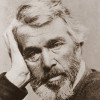“ The man's misery, as man's misery always does, came of his greatness. ”
Thomas Carlyle, On Heroes, Hero-Worship, and The Heroic in History (1841). copy citation
| Author | Thomas Carlyle |
|---|---|
| Source | On Heroes, Hero-Worship, and The Heroic in History |
| Topic | greatness misery |
| Date | 1841 |
| Language | English |
| Reference | |
| Note | |
| Weblink | http://www.gutenberg.org/files/1091/1091-h/1091-h.htm |
Context
“The depth and tenderness of his wild affections: the quantity of sympathy he had with things,—the quantity of insight he would yet get into the heart of things, the mastery he would yet get over things: this was his hypochondria. The man's misery, as man's misery always does, came of his greatness. Samuel Johnson too is that kind of man. Sorrow-stricken, half-distracted; the wide element of mournful black enveloping him,—wide as the world. It is the character of a prophetic man; a man with his whole soul seeing, and struggling to see.”
source


